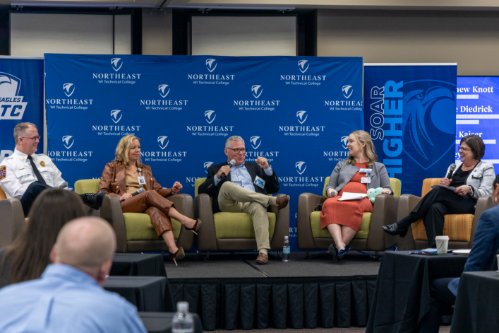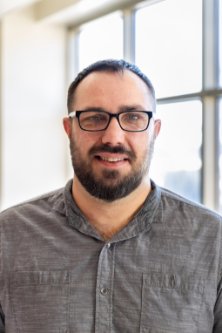During the opening plenary of DREAM 2021, a virtual convening of community colleges across the nation, Achieving the Dream (ATD) awarded Northeast Wisconsin Technical College (NWTC) the 2021 Leah Meyer Austin Award. The national prize is given annually to a college in the ATD Network that shows sustained, substantive improvement in student outcomes; narrowing and closing of equity gaps; and outstanding commitment to equity-centered cultural change at their institution.
“The Leah Meyer Austin Award recognizes bold, transformational changes that put equity, access, and student success at the center of their institutional priorities,” said Dr. Karen A. Stout, president and CEO of Achieving the Dream. “Northeast Wisconsin Technical College has demonstrated a tenacious commitment to making the college ‘student-ready,’ a cultural shift that has shown clear, positive impacts in the success of its students.”
Northeast Wisconsin Technical College serves 27,000 students living in northeast Wisconsin and beyond. Nearly half (49 percent) of students enrolled at NWTC are first-generation college students, 34 percent of students are Pell-eligible, and 80 percent of students are employed full- or part-time. More than 94 percent of NWTC graduates have careers within six months of graduation and hundreds continue their education through NWTC’s transfer agreements with nearly 40 other colleges and universities.
For more than a decade, NWTC has developed tools to reflect one of the college’s core values: everyone has worth. Since joining the ATD Network in 2010, NWTC has substantively increased student persistence, credit completion, and the proportion of students who successfully transfer and earn a baccalaureate degree. NWTC has also narrowed equity gaps for students receiving Pell grants, part-time students, and student parents. Not only did the college increase their overall proportion of students who transfer and earn a baccalaureate degree by seven percentage points, from 27 percent to 34 percent, but they also halved an existing equity gap on this measure between students who received Pell grants and those who did not.
“We are honored to receive the Leah Meyer Austin Award, a recognition that reflects NWTC’s core belief that everyone—no matter where they are in their personal and professional journeys—can dream big and soar higher,” said NWTC president Dr. H. Jeffrey Rafn. “Through our continuing partnership with Achieving the Dream, we are committed to share practices, policies, and procedures that provide an inclusive space for all people and create a respectful and stimulating environment.”
The Leah Meyer Austin Award was established in 2008 to recognize outstanding achievement in supporting and promoting student success through the creation of a culture of evidence, continuous improvement, systemic institutional change, broad engagement of stakeholders, and equity, with particular attention to low-income students and students of color. The annual prize is given in honor of Leah Meyer Austin, former Senior Vice President for Program Development and Organizational Learning at the Lumina Foundation and Emerita Director of the ATD Board of Directors, whose visionary leadership shaped the development of Achieving the Dream. Past Leah Meyer Austin Award winners have achieved significant national recognition including Aspen Prize for Community College Excellence winner Miami Dade College, and Aspen Rising Stars Pierce College and Palo Alto College.
Achieving the Dream (ATD) leads a growing network of more than 300 community colleges committed to helping their students, particularly low-income students and students of color, achieve their goals for academic success, personal growth, and economic opportunity. ATD is making progress in closing equity gaps and accelerating student success through a unique change process that builds each college’s institutional capacities in seven essential areas. ATD, along with nearly 75 experienced coaches and advisors, works closely with Network colleges in 45 states and the District of Columbia to reach more than 4 million community college students.



